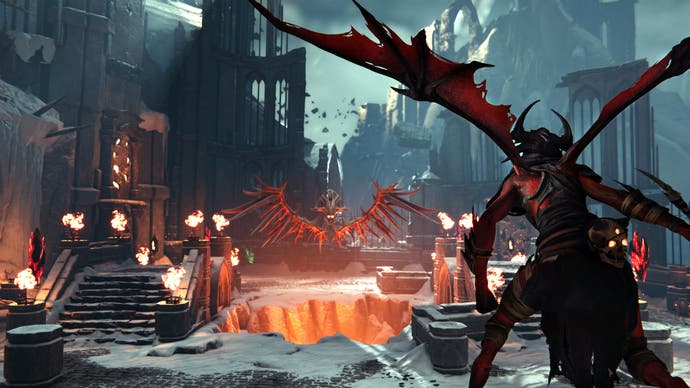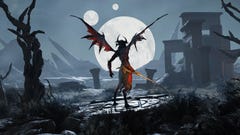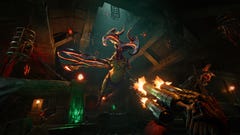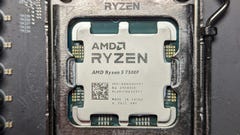Metal: Hellsinger review - a rhythm shooter that has no right to be this good
Hallowed Be Thy Game.
Forgive me, writers, but I could not recite a single lyric from the Metal: Hellsinger soundtrack. I want to say this is nothing personal - I can't remember the lyrics to anything, being honest; maybe I'm just a bad listener - but actually, it is also a bit personal. This is just how metal works, how listening to metal works: a genre, like the classic music it's always leant on, where each instrument has as much of a role in its storytelling and expression as a vocalist. To focus on one would be to miss the whole, enveloping gestalt of sound. You have to take it all in at once, to be both furiously dialled-in and totally zoned out, to enter the aural equivalent of a flow state. Or at least, this is what I would say if Mr. Hetfield ever quizzed me on why I can hum all eight-and-a-half minutes of Master of Puppets but only sing a couple words (Master, Master, something-something-something… faster). And more importantly, this is why Metal: Hellsinger is such absolute magic.
Metal: Hellsinger is a mashup of a rhythm game and a first-person shooter. Shooting in time with the beat of the music deals more damage and builds up a multiplier, missing the beat does the opposite. This is something that sounds like it's been around for ages, like it makes perfect sense, but in reality I can see why, outside of a couple of lesser-known indies, it hasn't really been done before. You want your shooting, in a shooter, to happen as and when you need it to happen, to be responsive and immediate, to be able to burst fire and empty a clip and pot-shot away when you need to - much the same as, I'd imagine, a composer would want their accompanying music to rise and fall with tension and difficulty and illustrate the drama of everything on screen. The practicality of constraining the two to the demands of each other, as well as the player, as well as themselves, sounds like a nightmare.
In Hellsinger it's a dream. Somehow, this thing works, and I'm loath to look much further into it than that but also feel like I must. Peering closer you'll see the seams of this game, the way it's been pulled and stitched together, the things that had to stay on the cutting room floor. Metal: Hellsinger's levels are decidedly linear, for instance, departing from the mazey side tunnels of Doom, from which it otherwise draws just so much inspiration. On paper this sounds like a bummer, in practise it's perfectly sensible: you can't go exploring off on side routes because this implies having time to go looking for side routes, to stop and ask yourself, "left or right?"
There is no time for anything but carnage here, so onwards. Occasionally you can see the logic of enemies spawning, with just the odd pause before more waves pop up, like a musician just taking half a bar to get back in time. Some boss fights, which take the monster mashing of Doom and mix it with the bullet hell of something like Returnal, feel just slightly constrained, like they can only throw so much at you at once without it simply becoming impossible to stay on beat. (Moving to third-person would help here, in some ways, allowing you to see more of your own positioning within the world around you - but then, the immediacy and intensity of being an FPS is part of the point. Again: see the seams.)
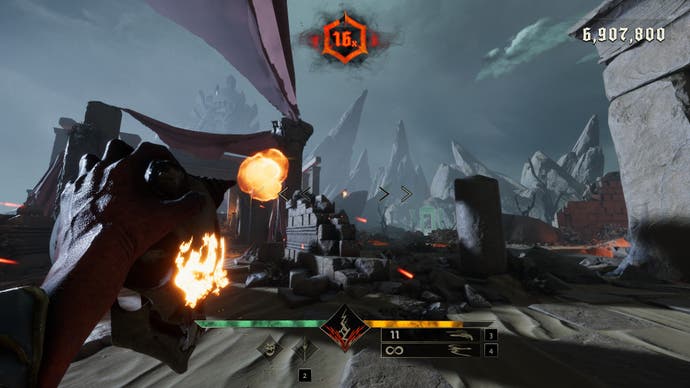

The flipside is that when you're playing Metal: Hellsinger, there is simply no time to look so close. The thing at the front of your mind is how it feels, not how it works, though you can rightly argue they're impossible to separate. The basics are that, around your crosshairs, there is an indicator for the beat of the current song playing, with a series of chevrons moving closer to the centre like the arrows of Dance Dance Revolution. You have a few weapons to pick from, so when you shoot, swing, cast or otherwise put 'em to work in time with that beat - and hit your enemy - you'll deal damage according to how in-time you are, little Perfects and Goods popping up, again, like DDR.
Continuously attacking in time with the beat will build up a meter for your score multiplier - Hellsinger is a score attack game as much as a Doom-clone, but then it's a lot of genres really. When the meter's full, and you kill an enemy, you go up a notch, doubling to x2, x4, x8, and x16, whereby kills and combos give you more points - and, crucially, where the music goes up a notch of complexity, too. So with no multiplier you just get a kick drum beat, at x2 a bit of bass guitar, x4 rhythm, x8 lead, and x16 vocals. This is what I mean by seeing the seams of Metal: Hellsinger - the musical layers are an ingenious solution to what you could call the Guitar Hero problem; the fact that missing a note sounds horrible and feels punitive, like the game starts with music and subtracts from it. Hellsinger is additive, built on the positive reinforcement of an extra little lick, a drilling double-kick, a scream. Headbanging is a prize here - and, much to my own disbelief, I have headbanged through the entirety of this thing without shame.
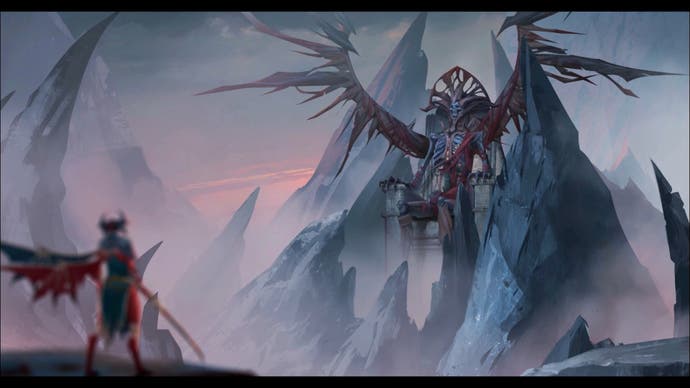
At the same time as all this there's another combo meter, showing how many hits you've landed without taking damage or whiffing a shot yourself, which awards extra bonuses, called boons, when you hit certain numbers untouched, and there are ultimate gauges for each weapon - cleverly kept separate, so you can build up an ultimate for your sword and then switch to your shotgun and build that one, so as to chain a load of combos at once should you wish. And you'll need to farm them for health, like the later Dooms post-2016, clicking the analog stick (in time, of course, albeit in an initially strange-feeling off beat) to zoom towards them and lop them into bits. Different enemies will require all this together, at times - there could be more variety visually speaking, but there's enough in action, enough to push and pull you around your arsenal, to draw you out of a comfort zone and force you into ever faster and more furious forward momentum. And this is the crux of it.
Metal: Hellsinger's momentum, its rhythm, its sense of propulsive power is just stellar. It talks of a "natural rhythm of the universe" to give you a big hint for keeping in time (look at the pulse of the explosive crystals, the puffs of flame from the sconces), but there's as much of a natural rhythm to any great shooter. It's something that's always been there with Doom in particular, the genesis of Hellsinger as an idea, from the flowing bob of Doomguy in John Romero's originals to the kick-punch-crunch of a melee kill in Doom 2016, or just the choreography of any good sequence of action, the shoot-grenade-melee of Halo. It's always felt heavenly when these things line up with music out of sheer synchronicity, like a kind of golden, audio-visual ratio in motion, like finding hidden Chladni figures in the code.
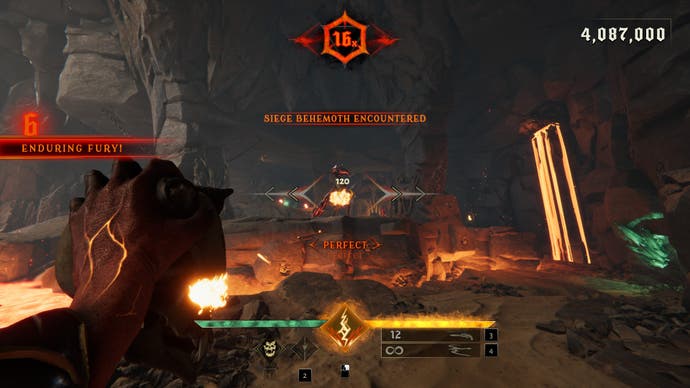


In making that kind of mechanical subtext into something so overt - into the text itself - Metal: Hellsinger took the risk of being almost blasphemous, turning a body inside out, a cross upside-down. Instead it does the opposite, making something that feels remarkably right. It's hard to suggest there's a whole genre here ready to spring up. Much of Metal: Hellsinger is defined by its restrictions, its context as something decidedly double-A, born of a kind of shared trauma that must resonate through developer The Outsiders since the cancellation of its previous game, Darkborn, after such obvious time and effort had been put into it.
Hellsinger is a light-feeling game compared to most, relatively short, although extended somewhat by side challenges and indefinitely by its leaderboards, with a campy, kill-the-devil story of fallen angels and giant skeletons that plays out like a moving Iron Maiden album cover. But all of this folds into a kind of irresistibly earnest spirit, a sense of total, shameless, cringeless, full-hearted sincerity. And so as much as it feels like an ode to the genre, Metal: Hellsinger also feels like an outpouring of emotion, as though the game itself is also a different, more personal kind of gestalt. The kind that makes heavy metal the marvel that it is, that's required to enter the fabled state of flow - or that compels even mild-mannered people to headbang in front of their TV.
